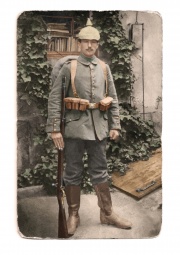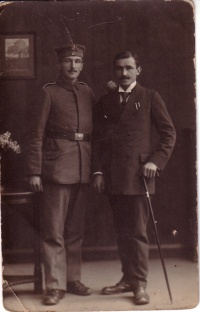Early Life↑
Dominik Richert (1893-1977) was born into a Catholic peasant family in the German district of Oberelsass in the Reichsland Elsass-Lothringen (annexed to Germany in 1871). He received a school education and then at the age of 13 joined his family in working their farm. He worked on the construction of the local railway branch for several years to supplement his family’s income. Richert grew up speaking the Alsatian dialect at home and German in school and recalled having mostly forgotten his French by the time of the war.
Military Career and Outbreak of War↑
On October 16, 1913 Richert was called up for military service and assigned to the First Company of Infantry Regiment 112 based in Mühlhausen. Richert was 20, and that same year represented a notable deterioration of relations between the population of Alsace-Lorraine and the German Empire. Sparked by the Zabern/Saverne Affair, an incident in which Prussian units garrisoned in the region insulted local civilians, a wave of popular outcry swept through the region. Ultimately, the failure of Wilhelm II, German Emperor (1859-1941) and the military to discipline the officers sowed discord in the press and the Reichstag and contributed to further acrimony and protests across the German Empire. Richert, for his part, resented his training and was taken by surprise at the outbreak of the First World War.
Richert served until November 1914 on the Western Front, where he was injured. After recovering, he was transferred to the Eastern Front in the spring of 1915, as Alsatian soldiers were then seen as a flight risk in the west. He returned to France in March of 1918 to take part in the German Spring Offensive and on the night of July 23, 1918 he delivered himself with two other soldiers to French troops. For this, the German military tribunal sentenced him in absentia to death. He remained in Alsace, which was returned to France after the war.
Memoir and Legacy↑
Richert wrote his memoirs after his desertion and return to Alsace. The manuscript was edited and published in 1989 by Knesebeck and Schuler in Munich as Beste Gelegenheit zum Sterben: Meine Erlebnisse im Kriege 1914-1918. It was subsequently translated into French and English. In 2018, a new German edition that presents the text in its original language without any omissions was published by Richert’s descendants. In Richert’s unsparing account of his wartime experience he rejects the patriotic language of glory and sacrifice. His account punctured historians’ image of the unqualified enthusiasm among recruits and of the Burgfrieden/Union sacrée. Richert’s account of desertion over French lines also encouraged the study of the everyday experience of ordinary soldiers during the war.
Carolyn Taratko, Vanderbilt University
Section Editor: Mark Jones
Selected Bibliography
- Inderwildi, Hilda: Naissance et constitution d’une conscience pacifiste dans les rangs des paysans alsaciens au moment de la Première Guerre mondiale. L’exemple de Dominik Richert (1893–1977), in: Cahn, Jean-Paul / Knopper, Françoise / Saint-Gille, Anne-Marie (eds.): De la guerre juste à la paix juste. Aspects confessionnels de la construction de la paix dans l'espace franco-allemand (XVIe - XXe siècle), Villeneuve d'Ascq 2008: Presses Universitaires du Septentrion, pp. 199-210.
- Koller, Christian: ‘Alsacien, Déserteur!’ Die Kriegserfahrung des Elsässer Bauern Dominik Richert im Spiegel seiner Memoiren, in: Bios– Zeitschrift für Biographieforschung und Oral History 13, 2000, pp. 226-239.
- Kramer, Alan: Wackes at war. Alsace-Lorraine and the failure of German national mobilization, 1914-1918, in: Horne, John (ed.): State, society, and mobilization in Europe during the First World War, Cambridge; New York 1997: Cambridge University Press, pp. 105-121.
- Richert, Dominik: Die Kriegsbücher von Dominik Richert, Bauer, aus St Ulrich / Elsaß 1914-1918, Dannemarie 2018: Daniel Lautie.
- Richert, Dominik: The Kaiser’s reluctant conscript, Barnsley 2013: Pen and Sword Military.
- Richert, Dominik: Beste Gelegenheit zum Sterben. Meine Erlebnisse im Kriege 1914-1918, Munich 1989: Knesebeck & Schuler.
- Wette, Wolfram: Die unheroischen Kriegserinnerungen des Elsässer Bauern Dominik Richert, in: Wette, Wolfram: Der Krieg des kleinen Mannes. Eine Militärgeschichte von unten, Munich 1992: Piper, pp. 127-135









